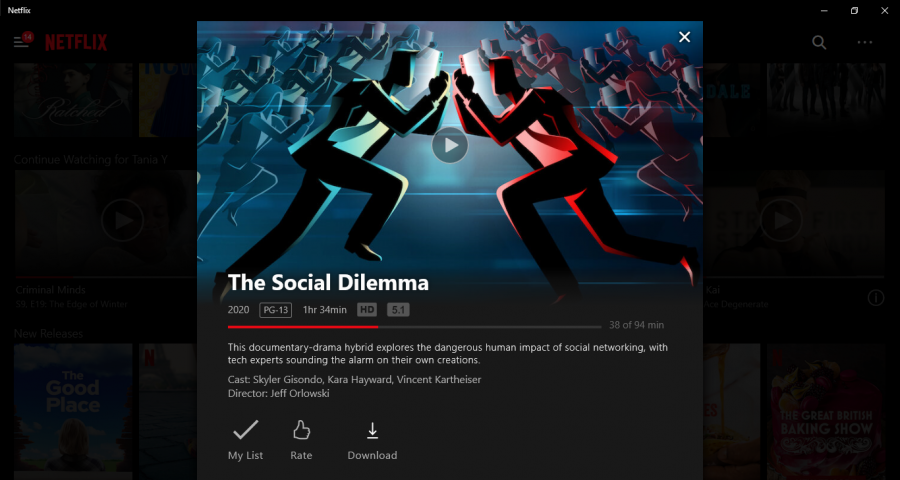Netflix documentary provokes viewers to reevaluate their use of technology
The Social Dilemma provides insight on the inner workings of tech companies.
October 12, 2020
Ever wondered why we are so addicted to our phones, more specifically to social media?
The Netflix documentary The Social Dilemma has provoked millions of viewers to rethink how much time they spend on social media and become more conscientious of tech companies’ real purpose in society.
The Social Dilemma introduces the conversation in a way that makes you rethink about how we function as a society as a whole. The documentary opens up about how the tech industry is dealing with this problem that does not have a name.
After viewing the documentary for the first time, my mind was boggled. I am aware of the effect technology has on our society, but what stunned me the most was how the algorithms were becoming more accurate at predicting what we liked and knowing us maybe even more than we know ourselves.
The main commentator in The Social Dilemma, Tristan Harris – who worked at Google as a design ethicist and currently serves as the president for the Center for Humane Technology – introduced the idea of ethical technology when he was still working at Google. The Google Slide presentation went viral at the tech conglomerate and quickly became old news.
Harris and other commentators introduce the idea of the psychology of persuasion and its technology application. Essentially, technology software is intentionally designed to modify our behavior, which in this case is to continue scrolling through social media until it becomes an unconscious habit.
You may be reading this right now and think to yourself or realize that you might have fallen victim to this. I know I have and did many times while watching this documentary.
When it comes to our unconscious habits, think about when you wake up in the morning. What is the first thing you do? Scroll through social media? Or do you immediately get up from your bed and get ready for the day?
If your answer is scrolling through social media before doing anything else, then the tech companies have completed their job.
Harris explains it best; it’s like if you were in Vegas playing the slot machine and anticipating what you are going to get. That is what it feels like when you turn your phone over checking for notifications or opening a social media app. We are baited to continuously scroll through social media for hours without realizing it.
This can also be accredited to the rise of surveillance capitalism, the economic system centered around the commodification of personal data with the sole purpose of making profit. If you aren’t the one paying for the product, then you are the product.
In essence, our data being collected by these tech companies is the product being sold.
The tech companies are competing against each other to gain your attention, wanting to keep you engaged in the app. They learn how we feel and make predictions about how we are going to feel in the future. This scares me because social media feeds are becoming too personalized. Plus, there is no actual human who is monitoring the data being collected, kind of making it feel like an episode of Black Mirror.
We are like lab rats, who are conditioned to look at more advertisements so that companies can make more money. This encourages an addiction-based technology environment, as we become more reliant on online interactions more than face-to-face interactions.
If you have not viewed The Social Dilemma, please do. The documentary will make you reevaluate the way you navigate through social media and how much time you spend glued to your screens.


